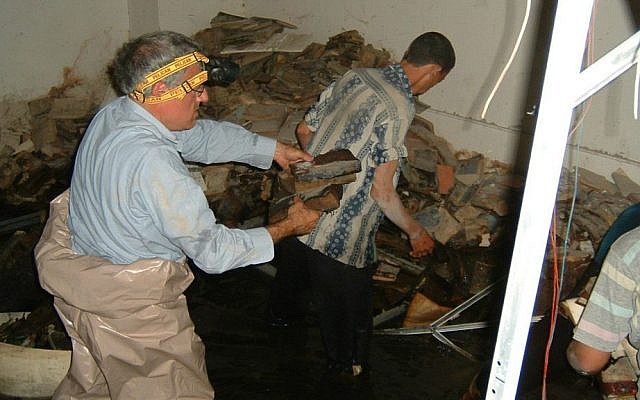The U.S. military found a treasure trove of Jewish artifacts in the basement of Iraq's intelligence headquarters. Who should get it: Iraq, the United States, or the Iraqi Jewish community in America?
WHAT’S MISSING
The Iraqi Jewish Archive.
When Iraq began allowing Jews to emigrate to Israel in the 1950s, it did so on the condition that the Jews forfeit nearly all of their property, from land to community records to books. The government stored tens of thousands of items in the basement of intelligence headquarters in Baghdad. Following the American invasion of Iraq in 2003, the U.S. military found the archive, which was in terrible condition thanks to a flood caused by an errant American bomb. The United States and Iraq agreed that the archive would be moved to the U.S. for preservation by the National Archives, and then returned to Iraq at a later date. It is currently being preserved in the United States.
WHY WE CARE
The Iraqi Jewish Archive represents the communal and individual records of the Iraqi Jewish community, which lived in and around Baghdad for 2,500 years. Driven out of Iraq after the creation of Israel, nearly all of its members live today in Israel and the United States. The Iraqi Jewish community claims the archive belongs to them, and want it returned to their care.
PROBLEMS WITH FIGURING OUT WHO SHOULD OWN IT
Iraq claims that the archive is its cultural property and national heritage, and thus belongs to the Iraqi nation and its people. It has a signed agreement with the United States for the archive originals to be returned. But some argue that such a scenario legitimizes the persecution of the Iraqi Jewish community and the theft of their property by Iraq’s previous authoritarian governments.
But if the United States keeps it, it violates the spirit (and in some cases the law) of international restitution, as well as agreements made with Iraq. Given the long history of Western countries grabbing up Middle Eastern artifacts, the United States is a party to multiple international treaties prohibiting this kind of cultural appropriation.
Similarly, returning the archive to the Iraqi Jewish community in the United States — absent an agreement with the Iraqi government — would set an uncomfortable precedent. It gets linked to the delicate question of restitution for Palestinian refugees, as well as other open questions around national vs. communal cultural property around the world.
FUN FACTS
The Iraqi Jewish Archive was inadvertently saved from destruction when the American bomb dropped on Iraqi intelligence headquarters crashed through the building but failed to detonate.
The oldest artifact in the archive is a Hebrew Bible from 1568 that had to be dried out in the sun to save it.
Iraq has been home to a vibrant Jewish community since the 6th century, BCE. By the 1940s there were over 120,000 Jews in the country. Today there are less than ten.
Article 14 of the Universal Declaration of Human Rights provides for the right of all people to own property individually and collectively, and for it not to be arbitrarily seized.
© Jason Harris 2019
The Iraqi Jewish Archive in the basement of Iraq’s intelligence headquarters. Photo credit: Times of Israel (Harold Rhode, Courtesy of the US National Archives).
The archive drying outside. Photo credit: National Archives
Music
Dudu Tassa and the Kuwaitis, “Hilwat Murrat El Layali” Spotify
Miri Mesika, “באה אליכם " Spotify
Yair Dalal, “Cellar Sessions”
Dudu Tassa and the Kuwaitis, “Wein Ya Galeb” Spotify


